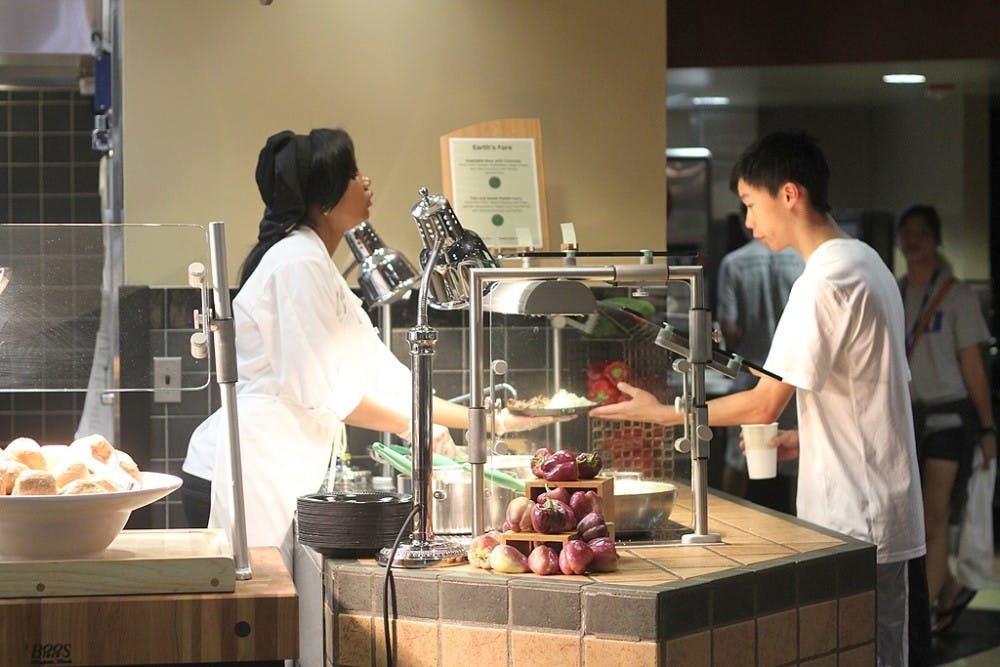It’s been four years since Duke announced it would raise its minimum wage for eligible employees and full contract workers to $15 per hour, but change has been slow to arrive for student jobs.
Duke’s work study program provides students with access to paid part-time jobs, with positions located both on and off campus. The Karsh Office of Undergraduate Financial Support updated their work study wage rules on July 1, outlining salary information, limits on earnings and more.
A significant portion of one’s work study salary is paid for by financial aid, depending on the type of work study that the position is listed under: either “federal” (75% subsidy) or “Duke” (50% subsidy). This title has no impact on the student’s earnings, as both hourly and maximum wages remain the same in either case.
According to Karsh guidelines, the allotted salary for a given work study job should be between $10.50 and $19.50 per hour depending on the complexity of its duties, though the maximum amount of earnings allowed for any posting is $2,200. In spite of these rules, however, the salaries of many positions offered to students hover at or below the lower limit of the salary range.
A DukeList posting on July 26 invites students to apply to be an assistant in Perkins Library for $10.25 an hour—below the designated range for work study job salaries. An event planning position from July 23 offers $10 to $11 per hour depending on the applicant’s experience and skills. Three paid jobs courtesy of the Duke University Press offer $10.70 per hour, a hair above the minimum allowed salary.
On the other hand, several non-work study jobs on DukeList consistently offer students much higher rates per hour. A remote software engineering internship listed on July 27 will give accepted candidates $20 an hour, as would an after-school child care posting from the day before.
While searching for job opportunities on DukeList last spring, sophomore Gabriel Moscoso managed to find a work study posting with middle-of-the-road wages. Moscoso spent the semester tutoring students and assisting teachers at underfunded Durham public schools through the America Reads America Counts program, earning $13.25 per hour for his efforts.
“One of the classes I was doing was an [English as a second language] class for kids who had recently come from South America, and one of the teachers couldn’t speak Spanish that well, so I was able to help her out,” Moscoso said. “We wanted to show [the kids] that there is a path to success by helping with whatever they need.”
When it comes to choosing work study opportunities, Moscoso feels as though the pay rate is as important as the job itself, if not more.
“[The tutoring position] was pretty good pay, and I was putting in 10 hours a week,” Moscoso explained. “The job is rewarding and pays well, but if it paid something like eight dollars an hour, I probably wouldn’t take it, since me working is critical towards me being able to afford Duke. In general, if a job pays below $10.50 per hour, I probably wouldn’t go for it.”
Moscoso hopes to continue his work in the fall but acknowledged that time management will be difficult with a return to in-person classes, making the need to find a well-paying and manageable job all the more important.
Junior Apoorva Das was focused on finding a job that would support her academic interests and post-college career regardless of salary. Rather than using DukeList, Das reached out to a postdoc working in a lab in the Bryan Research Building and was able to join the team as a research assistant with a solid wage of $15 per hour.
“I want to work for a few years after college, so I wanted to find a research position that would benefit me in college and after,” Das said. “They offered to increase the pay, but it was enough for me to sustain myself, since I don’t spend much money. I was fully okay with not getting paid; I didn’t need it.”
Hope for a raise
Miranda McCall, assistant vice provost and director of the Karsh Office, wrote in an email that student wages vary by position and are determined at the departmental level.
Despite the current trend of work study jobs offering low pay, there is reason to believe that rates may soon start to shift in a more financially-friendly direction.
“This has been under active consideration for some time, and we expect to be moving all work-study positions to a minimum wage of $15/hr soon to better align with Duke’s overall employment standards,” McCall wrote.
Get The Chronicle straight to your inbox
Signup for our weekly newsletter. Cancel at any time.
Gautam Sirdeshmukh is a Trinity senior and a staff reporter for the news department. He was previously the health & science news editor of The Chronicle's 117th volume.

